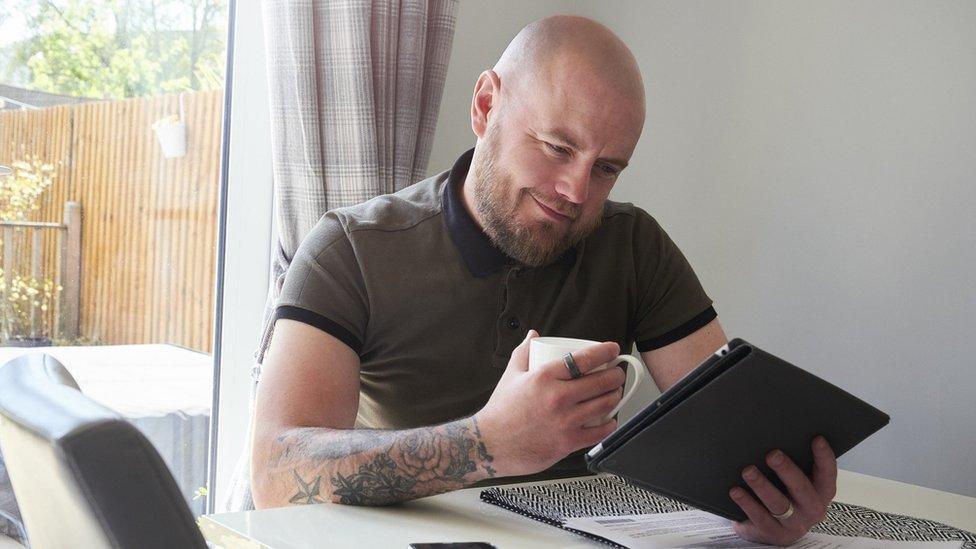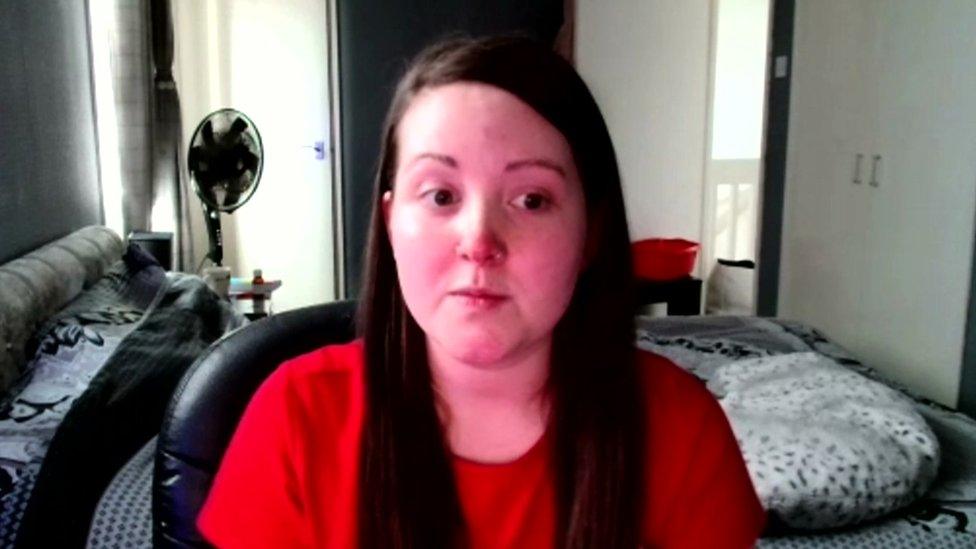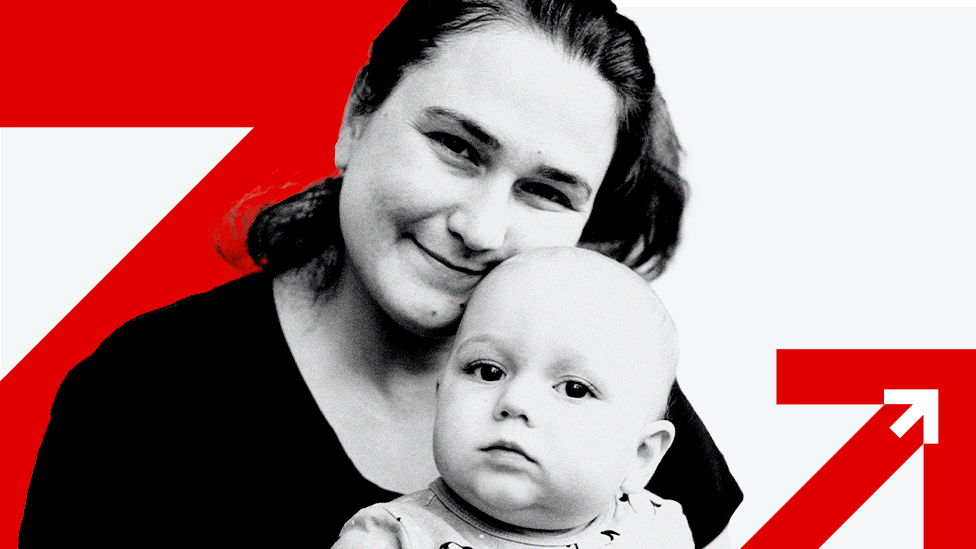Cost of living payment: Millions to get £301 to help pay bills
- Published

Low-income households are now starting to receive the latest cost-of-living payment from the government to tackle ongoing high bills.
Eight million means-tested benefits claimants, including people on Universal Credit, should receive the £301 instalment between now and 17 May.
Further almost identical payments will come in the autumn and next spring. All will be transferred automatically.
The payments come as food prices rise at their fastest rate for 45 years.
The cost of the supermarket shop has kept inflation - the rate of rising prices - stubbornly high in the UK. A typical household's energy bill also remains at £2,500 a year, although all of these bills are expected to drop later in the year.
Cost-of-living payments were originally introduced to help struggling families cope with the soaring cost of gas and electricity. Two payments totalling £650 were made last year.
However, they were never exclusively targeted at these bills, and households could always spend the money as they saw fit. Many are likely to use the latest instalment to cover the cost of putting food on the table.
How it is paid?
The latest £301 will be paid directly into eligible recipients' bank accounts, without the need to make a claim. It is £301 to distinguish it from the next two instalments which will be for £300 and £299.
The payment reference for bank accounts will be the recipient's National Insurance number, followed by DWP COL.
Those who qualify for the money solely through tax credits will receive their cost-of-living payment from 2 May.
In addition, during the summer, more than six million people with disabilities will get an extra £150. During next winter, over eight million pensioners will receive an extra £300.
Am I eligible for the money?
To qualify for a payment, you must receive one of Universal Credit, Income-based Jobseekers Allowance, Income-related Employment and Support Allowance, Income Support, Working Tax Credit, Child Tax Credit, or Pension Credit.
You will need to have been entitled to a payment for one of these benefits between 26 January and 25 February 2023, or payment for an assessment period ending between these dates.
Low-income pensioners who are eligible for, but not claiming Pension Credit, can still qualify for the cost-of-living payment if they make a successful backdated Pension Credit application by 19 May.
The Treasury Committee of MPs has previously criticised the "cliff-edge" of payment criteria, with those just outside the eligibility requirements missing out on hundreds of pounds of support when compared with those just inside the requirements.

Alannah Simpson says the money will help
Alannah Simpson, from Moray, is one of those who will receive the payment, and is also entitled to £150 as she has a disability.
She said the money was vital to help deal with the costs she and her family faced, but still was not sufficient as a whole host of essential bills had gone up.
It would cover some of their gas and electricity bill, "giving us the chance to stock up on food cupboard things and snacks for my son," she said.
"With everything going up in price there is always a bill that we are falling behind with," she said. "It is a constant battle of trying to keep up and catching up."
When will bills go down?
Many households will be using less gas during the coming warmer months, and the lights will be on less during the longer days. That, for some, will mean lower bills, although the difference is generally smoothed out for those who pay for energy via direct debit.
The likelihood is that bills could fall in the summer, as lower wholesale energy costs paid by suppliers feed through to consumers.

Here are some energy saving ideas from environmental scientist Angela Terry, who set up One Home, a social enterprise that shares green, money-saving tips.
Getting a water efficient shower head free of charge from your water company and using showers rather than baths
Considering loft insulation, which she says costs around £460 for a typical semi-detached home and could save £355 a year on gas bills
Hanging out washing instead of using a tumble dryer, and walk instead of drive when possible
Use windy days to feel where draughts are in the house. Wetting the back of your hand helps to locate them, then use insulation or draught-proofing tape
When available, press the smaller button to use less water to flush the toilet

Unclaimed energy vouchers
The government has also issued a fresh plea for customers with prepayment meters to cash in energy vouchers, which were to sent out to help with bills over the winter.
Monthly payments of £66 or £67 were posted or emailed to customers with traditional prepayment meters between October and March.
So far, customers have cashed in £620m under the government's Energy Bills Support Scheme, with £160m remaining unclaimed. Each voucher needs to be cashed within three months of issue but if any have been lost or have not arrived then suppliers can re-issue them until the end of June.
While government payments were processed automatically for people paying by direct debit, the process has been more convoluted for those with old-style prepayment meters, many of whom are on lower incomes.
Customers are being urged to double check they have cashed any remaining vouchers or ensure their details are up to date with their supplier before applying for vouchers to be re-issued.

How is the rising cost of living changing how you live your life? Please share your experiences by emailing haveyoursay@bbc.co.uk, external.
Please include a contact number if you are willing to speak to a BBC journalist. You can also get in touch in the following ways:
WhatsApp: +44 7756 165803
Tweet: @BBC_HaveYourSay, external
Please read our terms & conditions and privacy policy
If you are reading this page and can't see the form you will need to visit the mobile version of the BBC website to submit your question or comment or you can email us at HaveYourSay@bbc.co.uk, external. Please include your name, age and location with any submission.
Related topics
- Published15 February 2024

- Published19 April 2023

- Published16 April 2023
